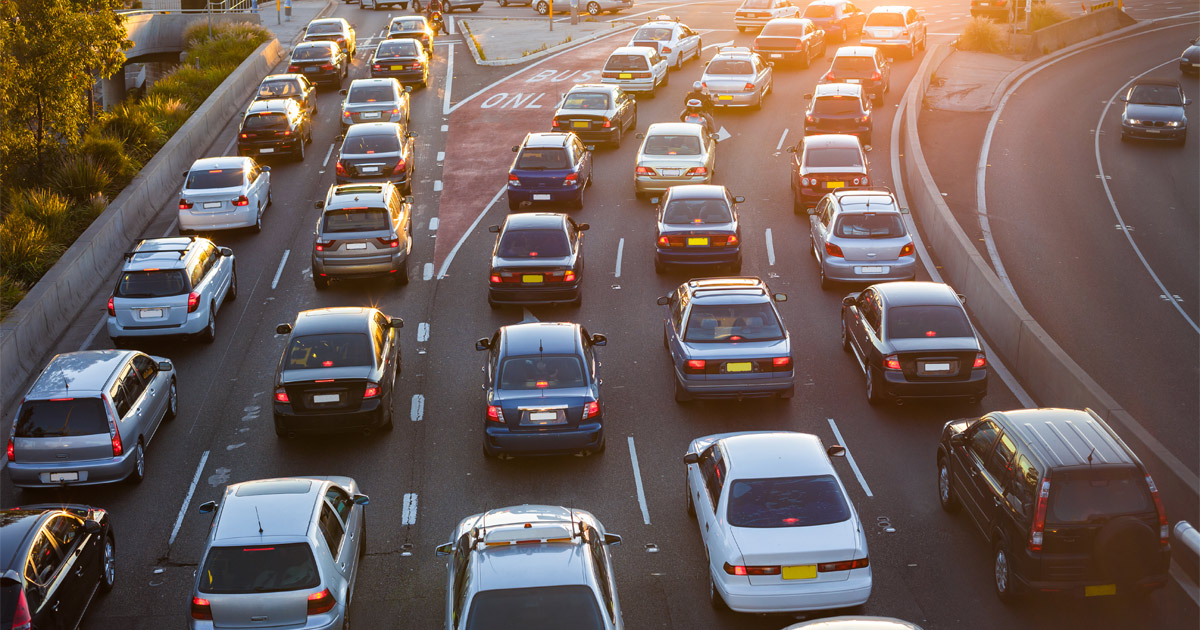The National Highway Traffic Safety Administration (NHTSA) reports that 36,096 people died in motor vehicle crashes on American roadways in 2019. Many of these crashes happened during morning and evening rush hours, when traffic congestion was at its peak. Drivers can prevent car accidents during their daily commute by following the rules of the road and taking several additional safety precautions.
Although it is safest to avoid driving during peak traffic times, commuting hours account for approximately 25 percent of the day. Many people have to commute to and from work during the week, typically between the hours of 7:00 a.m. to 10 a.m. and 4:00 p.m. to 7:00 p.m. NHTSA’s Fatality Analysis Reporting System (FARS) data from 2012 to 2016 revealed that 24.2 percent of fatal accidents occurred during these peak commuting times.
FARS data also shows that the deadliest time to commute is between the hours of 5:00 p.m. and 6 p.m., and Friday is the most dangerous day of the week, accounting for 20.5 percent of all accidents. Drivers are not the only ones at risk during these peak times, 26 percent of pedestrian fatalities occur between, 6:00 p.m. and 8:59 p.m., according to the NHTSA.
The National Safety Council (NSC) reports that non-fatal crashes are higher on weekdays, peaking on Fridays. Also, peak crash periods vary through the seasons, according to data from a 2018 NSC study. Typically, the peak time of day for both fatal and non-fatal crashes is from 4:00 p.m. to 7:59 p.m. In the past spring and summer months, fatal crashes peaked between 8:00 p.m. and 11:59 p.m., and non-fatal crashes peaked from noon to 3:59 p.m. during the summer.
What Makes the Daily Commute so Risky?
Traffic accidents are common during rush hour due to several reasons. Being aware of these factors may help reduce commuter crashes:
Distractions
Distracted driving killed 2,841 and injured 400,000 people in 2018 alone, according to the NHTSA. Cellphones, navigational devices, and passengers are all examples of distractions. Drivers often attempt to finish getting ready in the car on the way to work; applying makeup, looking in the mirror, or eating breakfast are common distractions. Those on the way home from work may also be distracted by emails and text messages.
The Centers for Disease Control and Prevention (CDC) advises drivers to keep their hands on the wheel and their eyes on the road. Distracted driving can increase the likelihood of a motor vehicle crash. Drivers between 15 and 19 years old are more likely to be distracted than drivers 20 years old and older, according to the NHTSA.
Speeding and Aggressive Driving
Speeding killed 9,378 people in 2018, according to the NHTSA and has consistently been a factor in approximately one-third of all motor vehicle fatalities. People who are driving to work may be running late and speed in an attempt to make it to work on time. Those on their way home from work may also speed and engage in other aggressive driving behaviors, such as tailgating. The American Automobile Association (AAA) Foundation for Traffic Safety reports that in 2019, nearly 80 percent of drivers experienced significant anger, aggression, or road rage when they were behind the wheel in the last 30 days before the survey.
Glare
Gare can reduce a driver’s ability to see, which can lead to increased reaction and recovery times. According to the NHTSA, nighttime glare can be especially dangerous due to less visibility and oncoming headlights. Sun glare also tends to be most prevalent at sunrise and sunset, times that coincide with rush hour traffic.
Impaired Drivers
Drunk driving remains a common cause of car accidents in the United States. The NHTSA reports that in 2018, there were 10,511 deaths from drunk driving crashes. People driving home from work, especially on Friday, may be under the influence of drugs or alcohol, marijuana, or other drugs. It is important to drive safely during these times.
Drowsiness
The NHTSA estimates that in 2017, 91,000 crashes involved drowsy driving. Drowsiness leads to slower reaction times and impaired attention and decision-making ability.
Drivers in morning or evening commutes may be tired, causing them to take their attention off the road. Drowsy driving crashes occur most consistently late at night, in the early pre-dawn hours, or in the mid-afternoon, according to the NHTSA. Motorists should get adequate sleep and avoid traveling when feeling fatigued to avoid a drowsy driving accident.
What Should I Do During My Daily Commute?
Virginia drivers can prevent accidents during their daily commute by taking several safety precautions:
Wear a Seat Belt: Not wearing a seat belt increases one’s risk of being killed in a car accident, according to the NHTA.
Leave Early: Leaving extra time to get to work can help commuters avoid speeding and causing accidents.
Avoid Cellphone Use: Technological distractions are at an all-time high. Commuters should put their cellphones away during their daily commute to reduce the number of distractions.
Follow the Speed Limit: Obeying the speed limit can help drivers avoid accidents. Commuters are also advised to pay attention to weather and hazardous road conditions, which may require further speed reductions.
Leave Extra Headway: When traffic is at its peak, increasing the stopping distance can help drivers avoid rear-end accidents and chain reaction collisions. Morning and evening rush hours are times when commuters should leave extra room between themselves and the cars in front of them.
Clean the Windshield: Keeping the windshield clean is an effective way to reduce glare. Drivers should make sure their windshield is clean and glare-free before heading out on their morning or evening commute.
Stay Calm: Many drivers become impatient on their drive home from work. Remaining calm in the presence of aggressive drivers can help commuters avoid accidents and road rage incidents.
What Should I Do After a Commuter Car Accident?
Those involved in a car accident should preserve evidence for a potential personal injury case, such as the location of the accident, photographs of the scene, and contact information of any witnesses. Car accident victims in Virginia may recover damages from the at-fault driver in certain circumstances. Since the statute of limitations for personal injury cases is two years in Virginia, it is advisable to contact a lawyer as soon as possible following an accident for assistance with a claim.
Virginia Beach Car Accident Lawyers Help Clients After Serious Commuter Collisions
If you were injured in a car accident on your daily commute to or from work, contact a Virginia Beach car accident lawyer today. At East Coast Trial Lawyers, our experienced legal team can protect your rights and get you the compensation you deserve. Call us at 757-352-2237 or contact us online for a free consultation. Located in Virginia Beach, Virginia, we serve clients throughout Chesapeake, Eastern Shore, Hampton, Newport News, Norfolk, Portsmouth, and Suffolk, Virginia, as well as North Carolina and nationwide.


